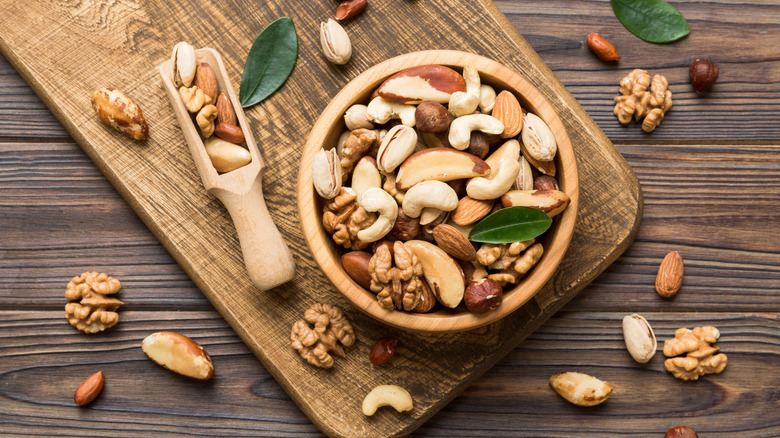The Two Best Proteins To Eat To Reduce Your Heart Disease Risk
Heart disease continues to be the number one killer worldwide, and people under 70 account for one-third of these deaths, according to the World Health Organization. Events from heart disease such as heart attacks and stroke don't always occur unexpectedly. You could see warnings of these episodes if you have high blood pressure, high blood sugar, high cholesterol, or obesity. Quitting smoking, reducing alcohol consumption, and regular physical activity can reduce your risk of heart disease, but what you include and exclude from your diet can also make a difference.
A 2023 meta-analysis in Critical Reviews in Food Science and Nutrition found that eating 50 grams of red meat a day is linked to a 9% higher risk of heart disease. Processed meat such as bacon, beef jerky, or corned beef can increase your risk of heart disease by 18%. Eating poultry doesn't increase your heart disease risk, but it also doesn't help to lower your risk.
If you're looking to increase your protein, you could turn to eggs, but a 2017 review in Critical Reviews in Foods Science and Nutrition found that eggs increase your risk of heart failure by 16%. No, you don't necessarily have to become a vegan to reduce your risk of heart disease. Instead, this same study says you can turn to protein sources such as nuts and fish to lower your risk of coronary heart disease, stroke, and heart failure.
How nuts reduce your risk of cardiovascular disease
Nuts are health powerhouses, offering a variety of micronutrients and bioactive compounds to protect your heart, according to a 2013 review in Current Nutrition Reports. Nuts have a high proportion of monounsaturated and polyunsaturated fatty acids to their saturated fats, and the omega-3 fatty acids found in nuts can reduce inflammation and narrowing of the arteries. You'll also find antioxidants like tocopherols, phytochemicals, phytoestrogens, and phytosterols in nuts to protect against heart disease. The magnesium, potassium, and copper from nuts can reduce your blood pressure.
Both short- and long-term studies have found evidence suggesting that nuts could improve your heart health by lowering your cholesterol. Many studies have focused on the anti-inflammatory and antioxidant properties of almonds and walnuts. Factoring all the healthy ingredients of nuts, you could see as much as a 30% reduced risk of heart disease if you eat a serving of nuts every day.
Why fish can be heart-healthy
Fish offers a wealth of heart-healthy benefits, making it a good protein source for your diet, according to a 2018 article in Nutrients. The high-quality protein in fish can help you feel full and improve your insulin sensitivity while bringing your triglycerides to healthy levels. Packed with essential nutrients such as omega-3 fatty acids, selenium, iodine, vitamin D, and taurine, fish has heart-protective nutrients. The omega-3 fatty acids, particularly EPA and DHA found in fatty fish, play a crucial role in lowering blood pressure, modulating inflammation, and reducing triglycerides.
A 2020 meta-analysis in Nutrients found that eating fish can reduce your risk of heart disease and mortality by 15%, and the more you eat, the better. For every 20 grams of fish you eat per day (that's less than an ounce), you can reduce your risk by 4%. In other words, a 4-ounce serving of fish per day could lower your risk of coronary heart disease and mortality by 24%.



